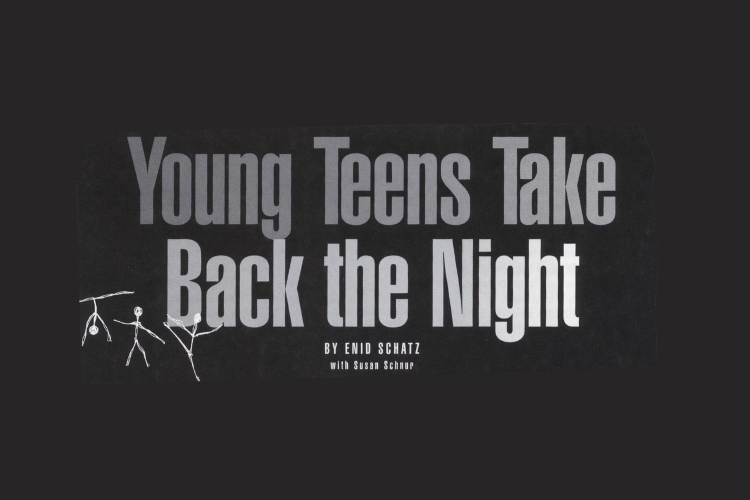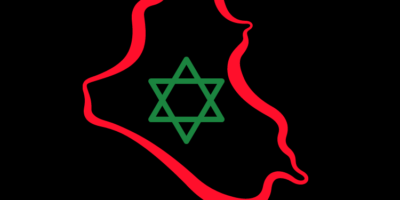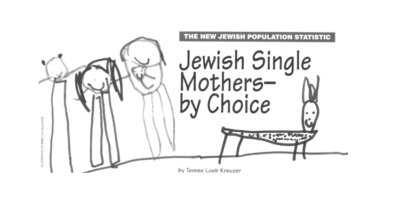
Young Teens Take Back the Night
“If, on the first day of mahaneh [summer camp], you had asked me to identify myself, I would have called myself a girl. Today I would say I am nothing less than a woman. “
—Elana Margolis, 13
Such a metamorphosis of identity in six short weeks could only occur at a place as committed to gender issues as Camp Galil, a Habonim Dror (labor Zionist) summer camp in Ottsville, Pennsylvania. “It’s not a camp,” 9 year olds are likely to report, “it’s a movement.”
Indeed, camp activities at Galil nearly all derive from Habonim Dror ideology, and counselors—most of us 18 to 20 years old (I was ancient at 23!)—are entirely responsible for brainstorming and implementing everything.
The movement has five pillars—Judaism, Zionism, socialism, social justice and self-actualization—which are taken seriously by most campers. “Social justice,” I overheard one 14 year old explain to a new camper last summer, “means fixing what’s not fair in society, like working for women’s equality and gay and lesbian rights. Self actualization,” she continued, “is not just having ideals, but making your actions be caused by them.”
Galil is not your run-of-the-mill Jewish summer camp.
Teen Consciousness-Raising
Consciousness-raising around gender issues is an important tenet of Habonim Dior, and at Galil last summer we created several programs committed to just this end. “Women” was the camp-wide theme for one entire week. and we also had a Take Back the Night rally mandatory for all campers (aged eight through fifteen). There were two Chug Nashim [women’s group] electives as well, one weekly and one daily. Since I had just graduated from Tufts with a Women’s Studies minor, I volunteered to lead both the Take Back the Night rally and the Chugai Nashim.
It was inspiring to me, in the Chugai Nashim, to see young teenagers, who’d had plenty of more lighthearted activities to choose from, elect instead to chew over heavy-duty women’s issues hour after hour. In place of their hofesh [free time], campers stayed overtime at the Chug to continue heated discussions about the feminist songs of Ani DiFranco, Tracy Chapman or Liz Phair, to share incredulousness and outrage about bride prices in India or female circumcision in Egypt, to read passages together from Our Bodies, Ourselves, to argue about the nuances of abortion and sexual harassment, and to talk with painful honesty about their own self-esteem struggles in relation to body image and the tyranny of pop media.
At season’s end, Chug Nashim participants put together a booklet comprised mainly of feminist song lyrics and meditations on their own personal growth. “This summer I have found a new identity which ties me to more than half the world’s population in a glowing chain,” wrote Sonia Reiter, 14. Jeremy Reiferson, also 14, wrote: “This summer I was ridiculed for being the only male in Nashim, but now people see that it will take everyone (of both sexes) working together if gender equality will ever be reached. DON’T BE AFRAID TO MAKE A STAND!”
Singing, Chanting, Banging Pots
Compared to planning the curricula for the women’s groups, figuring out how to put together a Take Back the Night was terrifying. Our program, a mandatory one for all campers, included pre-teen males who are a hard constituency and had disrupted such events in the past. Our committee (myself and two other counselors) had to remind ourselves both to take these kids’ inevitable acting up in stride, as well as to come up with programming that they’d least resist.
What we decided was that the evening needed to start coed, continue with single-sex activities, and end coed. This rhythm worked extremely well, and it additionally let us model for the campers the validity of consciousness- raising in both separatist and integrated forums.
The Take Back the Night activity started with campers in small groups gathered in various cabins. Counselors set a tone of seriousness, and then, talking (and teaching) about sexism, discrimination and other hurts, allowed campers to think about these experiences in their own lives. Campers then anonymously wrote down incidents of such hurts in their own lives (or in the lives of someone near to them). We collected their papers in order to read them at the very end of the evening (around a bonfire), and to symbolize the end of such injustices and pain by throwing all the papers into the fire.
Next, we separated females and males. The female part of the program started with singing feminist songs, like “Testimony” and Ani Difranco’s “Gratitude,” and reading feminist poetry. Counselors then explained what Take Back the Night rallies are, how on our own various college campuses many of us have marched en masse down streets where we usually, as women, feel unsafe (like on fraternity rows), banging pots, chanting, making noise to show our presence. and then testifying, one speaker after another—telling stories about discrimination, violence, sexual exploitation and harassment.
With the basic goal of encouraging the girls and young women to ask questions, voice their fears, and speak out strongly in a particularly safe and supportive environment, we then role-played a situation in which a woman is harassed on the street. Calling “freeze,” we encouraged discussion about different possible reactions to this situation, how individuals in our group have reacted in similar situations, how we wish we had reacted, and how we would ideally like to act in the future.
We talked about the notion of “victim guilt,” about how hard it is, sometimes, for females to say the word “No” out loud, and we felt our own strength screaming “No!” together. I was surprised at how empowering this exercise turned out to be for the campers. Hearing their own voices ring out in the still July night was so thrilling that the 8 year old in particular kept asking to do it again and again.
After more songs and chants (including some Take Back the Night standards like “Women unite! Take back the night!”), we marched towards the bonfire chanting. I think that nearly everyone felt that this part of the program was highly successful— enlightening, responsible, and exciting.
Helping Boys Become Feminists
Meanwhile, the boys and young men (age 8 through 15) were divided by age into four groups that rotated through four different activities.
At the first station, campers drew pictures (in retrospect, it would have been easier to use magazine cutouts)— of males, ranging from stoop shouldered nerds to superhunks; and of females, ranging from babushkas to supermodels—and they discussed what kind of beauty myths exist for both males and females, how those rules make boys and young men feel, whether campers think they should conform, as males, to these rules, and whether they think they should encourage females to conform to such rules.
The second station was about words—and the pain they can inflict. Asking campers to think about insulting words for Jews and for other sub-groups that they’re a part of, counselors helped campers articulate how they themselves have been hurt by name-calling and what that was like. After the campers “got” this side of the equation, the campers next discussed insulting words for females, and how they themselves have, perhaps inadvertently, hurt girls through name-calling.
The third station dealt with the word “No.” Going around in a circle, campers described situations in which they had said “No” to something and were proud of that, or had said “Yes” when they wanted to say “No,” and the conflicts and feelings these situations aroused. Younger boys talked about “good touch/bad touch,” and older teens discussed how positive it might feel, in their own sexual experience, to create an atmosphere that empowered their partners to courageously say “Yes” or “No.”
Finally, at the fourth station, campers were asked to talk about the notion of “maleness.” Going around the circle twice, campers told stories about what it felt like to be male—challenges, privileges, occasions for pride and for shame.
Overall, the male part of the program was felt to be successful by most everybody, though there were glitches. Some 13-year-old boys simply laughed at the pictures of large-breasted women they and their friends drew, and some 8 year old felt (during the “maleness” exercise) that they were being blamed for “something,” but they didn’t know what. By and large, we counselors felt that we had managed to cut down on 12- and 13-year-old boys’ acting out (though they still used the opportunity, during the “words” exercise, to call women “bitches” over and over), and that we had succeeded in helping many male campers ask themselves some introspective questions, and begin to understand—for the first time—that they can be a part of girls’ and women’s empowerment process. This felt significant to us.
The evening ended with a coed bonfire where campers began to express their understanding that there are certain issues that entire communities must face together. The campers read out loud each other’s anonymously written notes, and threw them into the fire. Some were more common painful experiences (“I hate it when we play sports and I’m not picked because I’m a girl—even though I’m very good”); some were less common (“When I was young I was touched and I felt bad about it, but now I realize what it was”); and some were fairly scary and heavy (“My cousin was raped and she came home from the hospital and we didn’t know how to talk to her. Now I’m sad I didn’t just give her a hug”).
Back in our respective cabins at the end of the night, many campers and counselors talked on for hours.
Why Don’t All Summer Camps Teach Responsible Stuff?
I remain surprised by how few Jewish camps take the opportunity to teach basic justice issues and to do values clarification work with teens and pre-teens—especially considering it’s such a low-budget proposition. Because kids spend 24 hours a day together in an atmosphere that’s different from school, summer camp is a gold mine for modeling thoughtful introspection and for teaching about personal and social responsibility.
For myself, creating programming that helped raise consciousness for pre-teens and teens around gender issues was immensely gratifying. When I was a kid, I attended a Jewish summer camp where there was no awareness about these issues. It would have meant a lot to me, as a 10 year old or a 14 year old, to have had a summer with such programming.
I don’t fool myself that we transformed campers—but we did create an awareness, and that’s a major step. I also feel good that, despite my insecurity about whether I had expertise in the matter, I still jumped in to help make these programs happen.
Perhaps most importantly, the campers’ commitment to raising their own consciousness was inspirational to me. As a young feminist myself, I was honored and excited by the active role I was able to play in the lives of young people—as a teacher, leader and role model.
Enid Schatz is spending the next two years in Israel with Interns for Peace. For her explicit curricula for both teen women’s groups and Take Back the Night, send $3 to LILITH at 250 W. 57th St., Suite 2432, NY, NY 10107.




